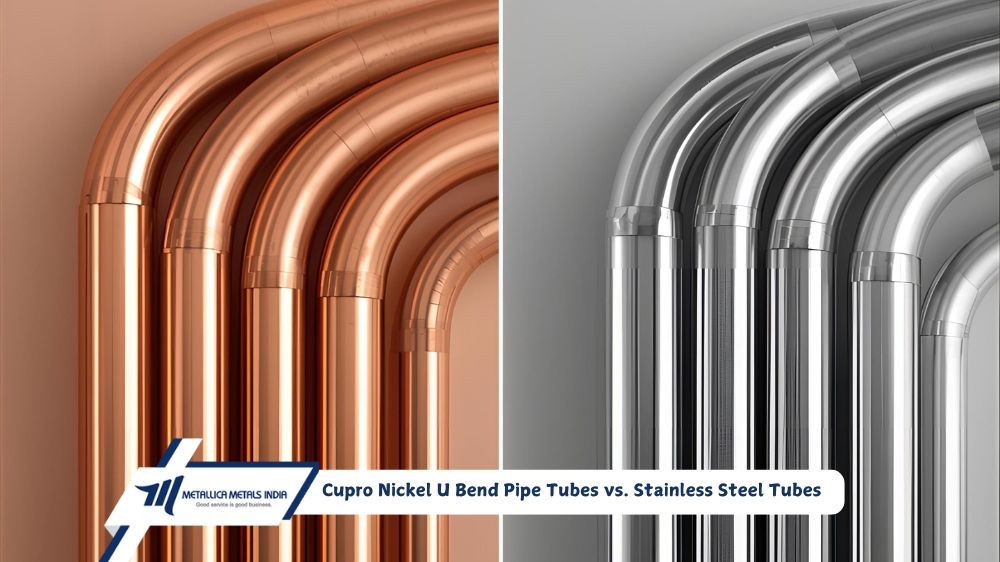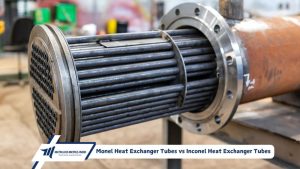The tubes in condensers perform significant tasks. They carry fluids, transfer heat, and stand up to tough conditions. Choosing the right tube material is a big deal, especially in systems where performance and reliability matter.
Cupro Nickel U Bend Pipe Tubes and Stainless Steel Tubes are two excellent choices. Each has advantages, and disadvantages, and the best choice will rely on the condenser’s intended use. To help buyers, engineers, and maintenance teams make wise decisions, we’ll compare the two in this post.
Understanding Condensers and Their Requirements
Role of Tubing in Condensers
Condensers are used to cool vapor into liquid. They are used in desalination units, HVAC systems, power plants, and marine installations. These systems tubes transport hot or cold fluids, facilitating the quick and effective reduction of heat.
But it’s not all about transferring heat. These tubes must also withstand corrosion, pressure, and endure for years. Some are exposed to salty sea winds. Others operate with chemicals or heat. That’s why the tube material is so important.
Overview of Cupro Nickel U Bend Pipe Tubes
What Are Cupro Nickel U Bend Pipe Tubes?
Cupro Nickel tubes are made from copper and nickel, usually in two common blends: 90/10 or 70/30. The U-bend shape helps them fit snugly into heat exchangers or condensers, cutting down on space and welds.
They have been known for performing well in damp, salty environments, particularly on ships or close to the ocean. They are made by bending and heat treating the metal to maintain its strength and smoothness.
Key Properties and Benefits
Cupro Nickel is excellent at preventing corrosion from seawater. It also repels biofouling, so less gunk accumulates in the tube. That’s lower cleaning expenses, and improved heat transfer in the long run.
These tubes also have high thermal conductivity, which can push heat more quickly. They’re also stable under wet air and salty spray, making them well suited for marine applications.
Common Applications
You’ll see Cupro Nickel U Bend Tubes in:
- Ships and submarines
- Desalination plants
- Offshore oil and gas rigs
- Marine and industrial heat exchangers
Overview of Stainless Steel U Bend Pipe Tubes
What Are Stainless Steel U Tubes?
Stainless steel U tubes are made from iron and chromium, with other elements added for strength and corrosion resistance. Grades 304, 316 and 317L are frequently found in condensers. These grades provide various degrees of heat strength and resistance to rust.
Depending on the task, they can be bent or straight and are created using seamless, or welded processes.
Key Properties and Benefits
In accordance with its strength, stainless steel can withstand high pressure and heat. It resists rust well especially 316 and 317L in chemical or humid settings. It’s also cost-effective in clean or mildly corrosive systems.
It lasts a long time, especially in setups where the water is treated or not too salty. It’s tough against wear and pressure, which helps cut down on breaks or leaks.
Common Applications
- Stainless steel tubes are used in:
- Power plants
- Chemical processing
- Food and beverage factories
- Pharmaceutical equipment
Side-by-Side Comparison: Cupro Nickel vs. Stainless Steel Tubes
Corrosion Resistance
Cupro Nickel stands out in saltwater and marine settings. It fights off rust and bio-growth without coatings.
Stainless steel does well in fresh water or lightly treated systems. Higher grades resist rust better, but not as well as Cupro Nickel in seawater.
Thermal Conductivity and Heat Transfer Efficiency
Cupro Nickel has better thermal conductivity. It moves heat faster which boosts overall system performance.
Although stainless steel falls short in this particular area, it might work well enough in systems with less demanding heat transfer requirements.
Mechanical Strength and Durability
The tensile strength of stainless steel is higher. More pressure and stress can be handle before it bends, or cracks.
Cupro Nickel is more elastic but softer. It withstands vibration-intensive systems without becoming brittle.
Fouling and Maintenance
Cupro Nickel is naturally anti-fouling. That is less maintenance and improved long-term flow.
Stainless steel can require more attention in systems that have untreated or mineralized water.
Cost and Availability
Stainless steel tends to be less expensive initially. It’s very readily available and in numerous grades and sizes.
Cupro Nickel is more expensive, particularly the 70/30 grade. But its high lifespan and reduced maintenance can offset that in the long run.
Environmental Considerations
Both materials are recyclable. Stainless steel has a lower footprint in clean water systems. Cupro Nickel may need more care in production, but its long lifespan helps balance the impact.
When to Choose Cupro Nickel U Bend Pipe Tubes
Choose Cupro Nickel for:
- Marine condensers
- Saltwater cooling systems
- Desalination plants
- Offshore rigs
It’s built for harsh, wet, and salty spots. If corrosion is your main worry, go with Cupro Nickel.
When to Choose Stainless Steel Tubes
Pick stainless steel for:
- Power stations using clean or treated water
- Chemical plants
- Food and drug equipment
- Jobs with high pressure or heat
It’s ideal when you need strength, heat resistance, and a tighter budget.
Which Tube Type Is Better for Your Condenser Needs?
Both tube types work well but in different ways. Cupro Nickel U Bend Pipe Tubes are the top pick for salty, high-humidity jobs. They fight off rust and bio-growth and move heat fast.
For clean systems that require strength and value, stainless steel tubes are excellent. When the water isn’t too harsh, they can withstand pressure and last a long time.
Your setup will determine the best option. Consider the fluids your system uses, where it operates and how frequently you want to perform your maintenance. If you choose the right material, your system will last longer, perform better, and have fewer issues.







